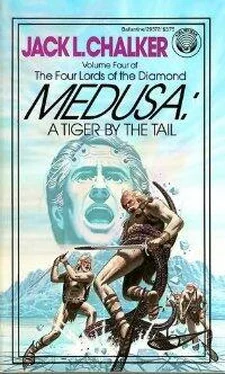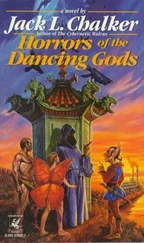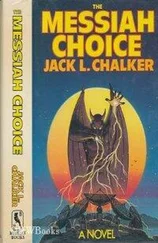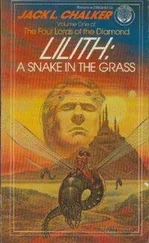Jack Chalker - Medusa - A Tiger by the Tail
Здесь есть возможность читать онлайн «Jack Chalker - Medusa - A Tiger by the Tail» весь текст электронной книги совершенно бесплатно (целиком полную версию без сокращений). В некоторых случаях можно слушать аудио, скачать через торрент в формате fb2 и присутствует краткое содержание. Год выпуска: 1983, ISBN: 1983, Издательство: Del Rey, Жанр: Фантастика и фэнтези, на английском языке. Описание произведения, (предисловие) а так же отзывы посетителей доступны на портале библиотеки ЛибКат.
- Название:Medusa: A Tiger by the Tail
- Автор:
- Издательство:Del Rey
- Жанр:
- Год:1983
- ISBN:0-345-29372-X
- Рейтинг книги:4 / 5. Голосов: 1
-
Избранное:Добавить в избранное
- Отзывы:
-
Ваша оценка:
- 80
- 1
- 2
- 3
- 4
- 5
Medusa: A Tiger by the Tail: краткое содержание, описание и аннотация
Предлагаем к чтению аннотацию, описание, краткое содержание или предисловие (зависит от того, что написал сам автор книги «Medusa: A Tiger by the Tail»). Если вы не нашли необходимую информацию о книге — напишите в комментариях, мы постараемся отыскать её.
Medusa: A Tiger by the Tail — читать онлайн бесплатно полную книгу (весь текст) целиком
Ниже представлен текст книги, разбитый по страницам. Система сохранения места последней прочитанной страницы, позволяет с удобством читать онлайн бесплатно книгу «Medusa: A Tiger by the Tail», без необходимости каждый раз заново искать на чём Вы остановились. Поставьте закладку, и сможете в любой момент перейти на страницу, на которой закончили чтение.
Интервал:
Закладка:
“The Warden organism,” he breathed.
“The concept is not unknown in nature. As to why they always prefer our kinds of planets, and remake them into our kinds of planets, nobody really knows. They are the classic alien—so different from anything we know, any form of life we know, any life origins we can understand, that they are totally incomprehensible to us. Your man on Medusa once made a fringe contact with this one. Do you remember it?”
He nodded. “I thought it was the computer.”
“What was your impression?”
He thought a moment. “It was aware of me, but didn’t have much of an opinion about it. I got the impression of a sense of utter superiority out of the thing, and I had the feeling it noted me, then flicked me aside as we would a fly.”
“I have been—far deeper—hi contact over the years,” Morah told him, “and I find it an impossible, frustrating task. I’m not even certain that what we get into our minds really correlates with the real Coldah. There is an undeniable sense of power—and why not? They have it, that’s for sure. Beyond that—who knows? They are certainly aware we exist, and they are even aware of who their friends are, but that’s about it. Perhaps, one day, we will know, but I somehow doubt it. All we can do is study them and learn what we can. They’re impossible creatures, but whatever they do they seem to obey the laws just as we do. They just might know a few more laws than we do.”
The viewscreens were blank now, except for the long-shot view of Medusa, still molten hot yet cooling even now, swaddling itself in an incredibly thick and violent layer of clouds. He turned to the plot board, which showed no white dots or forms whatsoever and yellow forms only in the mop-up battle operations. It was over. The greatest task force ever assembled by man had been met, and bested, partly by a better assembled force that had an easier time on the defense, and partly by a creature they could neither understand nor believe in even as it was killing them.
“Where’s this thing going now?” he asked Morah.
The security chief shrugged. “Wherever it wants. Probably to another of our planets, to burrow in once again. They go from system to system until they find a planet within our life zone around a stable sun, then they burrow in and remake the surface out of matter and energy. It’s never the same twice, but always something familiar to us, even the atmosphere. It’ll stay there a thousand years unless disturbed, as this one was, then rise again, move on, find the next planet, and start it all again. You know, when they leave on their own they do virtually no damage to the planetary systems their little symbiotic riders create? They just leave ’em. I think a number of mysteries about how so many worlds have formed within our life tolerances may be answered by the Coldah. As random as they are, most of the planets they use are not initially inhabitable, but they leave them that way. Once they leave their little symbiotes don’t destruct, as they do when in residence and taken away, but just sort of fade out. Normal evolution follows.” He chuckled. “You know, it’s even just possible that our own race, and the Altavar, grew up over the millions of years because of Coldah lifestyles. It’s a fascinating concept.”
“But the Altavar—they fought these things. And now they seem almost to protect them.”
“That’s true,” Morah agreed, telling one of his aides in an aside to get them all strong drinks, “but in the thousands of years they fought and studied the Coldah, a funny thing happened. Somewhere along the line they got tired of it, just got sick of futile head-knocking, and sort of mentally surrendered to the big bastards. To the Altavar, the Coldah became their whole life, and in a probably gradual switch they came not only to accept the existence of these creatures but to actually work with them. Don’t ask me to explain it—it’s certainly religious, or mystic, in a way, and those are unexplainable even when we’re talking about our faiths, yet they are coldly and scientifically devoted to the great project, as they call it. They protect the Coldah from outside interference whenever possible, and they try with their fleets to nudge the Coldah into worlds that need some work. Don’t ask me how that’s possible, bat the Coldah, once the Altavar started helping rather than fighting, seemed to go along with it.”
He nodded. “But not here.”
“Well, it was impossible, for one thing. When the Coldah originally came to the Warden system we were still stuck knee-deep on old Mother Earth. These four worlds were pretty piss-poor rock piles with nasty atmospheres and surface pressures, just perfect. And when a particularly big, fat, Coldah arrived, it did something the Altavar, with all their experience, had never seen before. It reproduced by fission. It made triplets, in fact, and the one old and three new ones entered into the four Diamond worlds. Shortly after, they released, or made and released, or whatever, their little beasties, and they went to work on the world, making it over. Lilith, with the original mama Coldah, had the most rigid system imposed on it. Then the Altavar moved in. In the years they have studied, fought, then served the Coldah, they learned a lot. They can make their own Wardens, and they can give orders to these synthesized versions, too. Within limits, they can even play games with the Coldah versions, and they did here. Looking at the climates, they elevated one species on each to dominance.”
“I figured that much out. Reptiles on the warmest world, insects on the lushest, water breathers on the wettest, and mammals on the coldest.”
“Right Part of their own grand project, really. Since die Coldah can leave, although not arrive, with a minimum of fuss—it’s sort of like a big mist rising, they tell me—leaving the worlds to natural laws, they’ve been trying to influence their direction. It’s a very long-term concept, naturally, but they are really trying to learn what factors and conditions produce intelligence one place and not another. Ifs pretty complex. Of course, our arrival screwed up the project here.”
“And because, somehow, the electrochemical wavelengths on which the human brain operates were just slightly off the wavelengths used by the Coldah to command the Warden organisms, we developed these wild talents.” He paused for a moment, then added, “I assume the Altavar are nowhere near those wavelengths?”
Morah chuckled. “No. Oh, they can tune in, as it were, mechanically, but not biologically.”
He whistled low and grabbed a drink as it arrived, drinking a bit more in one gulp than he should. He needed it. Finally he said, “Then we became the project.”
“Yes. We became the project. But in order to control it, and to minimize interference between ourselves and the Coldah, the Confederacy was in the way. The Coldah are headed, generally, in our direction—or back to it, I don’t know which. The idea of our race, who can, as it were, tune in on at least one Coldah band, threatened the Altavar, their lifestyle, their system of beliefs. I think they were actually afraid that, if we followed the same pattern as they did, we could eventually establish contact, even rapport with the Coldah. Maybe we can, although I think they may simply be too alien ever to understand or communicate with on more than a basic level.”
He smiled wanly and shook his head in wonder. “Then, to the Altavar, \ve were the demons. They were scared of us stealing their gods. If the results weren’t so tragic they’d be almost funny, you know that?” He thought a moment. “But if we were that much of a threat to them, the snake that could steal their Eden, why not just wipe out everybody but the project people—the {)iamond?”
Читать дальшеИнтервал:
Закладка:
Похожие книги на «Medusa: A Tiger by the Tail»
Представляем Вашему вниманию похожие книги на «Medusa: A Tiger by the Tail» списком для выбора. Мы отобрали схожую по названию и смыслу литературу в надежде предоставить читателям больше вариантов отыскать новые, интересные, ещё непрочитанные произведения.
Обсуждение, отзывы о книге «Medusa: A Tiger by the Tail» и просто собственные мнения читателей. Оставьте ваши комментарии, напишите, что Вы думаете о произведении, его смысле или главных героях. Укажите что конкретно понравилось, а что нет, и почему Вы так считаете.












